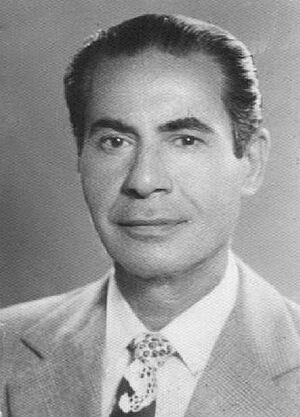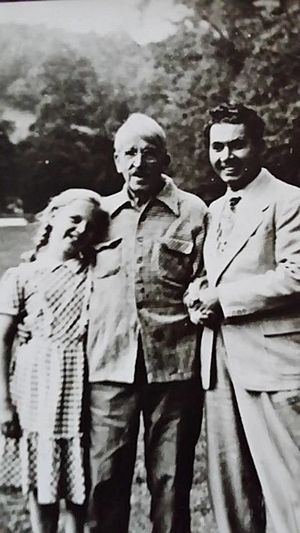Nuri Ja'far facts for kids
Quick facts for kids
Nuri Ja'far
|
|
|---|---|
| نوري جعفر | |

Jafar c. 1960s
|
|
| Born |
Nuri Ja'far Ali al-Chalabi
1914 Al-Qurna, Basra vilayet, Ottoman Empire
|
| Died | 7 November 1991 (aged 77) |
| Alma mater | University of Baghdad, Cairo University, Ohio University |
| Occupation |
|
Nuri Ja'far (born Nuri Ja'far Ali al-Chalabi, 1914 – 7 November 1991) was an important Iraqi thinker. He was a psychologist, a philosopher of education, and a writer. He wrote over 50 books about teaching methods (called pedagogy), how the mind works (psychology), history, philosophy, and literature.
After finishing his studies in Baghdad, he traveled to the United States. There, he earned his master's degree in 1948 and his doctorate (a very high degree) in philosophy in 1949 from Ohio University. He was a student of the famous educator John Dewey. Later in his life, he moved to Libya to teach at the University of Tripoli, where he stayed until he passed away.
Contents
About Nuri Ja'far
His Early Life and School
Nuri Ja'far was born in a place called Al-Qurnah, in what was then the Basra region. His father was a farmer, and his mother, Halimah, was a kind and tolerant woman who read the Quran. Nuri also had a brother named Radhi.
In 1926, an elementary school opened in Al-Qurnah. Nuri's mother really wanted him and his brother to go to school. His father agreed to send Nuri, but not Radhi. Nuri later shared a funny story about his first day:
My father took me to the school, and my mother gave me the Qur'an. We entered the interview with a good principal, Mr. Yassin Al-Mulla Huwaysh. My father said: " This is my son, I want to enroll him, and he is reciting the Qur'an." The principal asked me to read... I shivered unbearably so that the Qur'an fell from my hand, I picked it up, kissed it. I opened it not on the appointment, and I didn't look at it, I was shivering. I started reading the verses that I memorized amazingly.... The principal said come near me. He looked and found me holding the Qur'an upside down... He encouraged me, and enrolled me in the second grade.
At school, Nuri loved mathematics, the Arabic language, and history. After high school, he worked as a teacher in Al-Qurna from 1936 to 1938. He then became an educational inspector, checking on schools, in Karbala and Basra from 1942 to 1943.
His Advanced Studies

Nuri Ja'far really wanted to continue his education. He dreamed of becoming a doctor and tried to get into medical school in Baghdad. But he couldn't afford it. The dean, Harry Sinderson, asked if he could pay 5 dinars a month, and Nuri replied that he had never even seen that much money in his life!
Even though he couldn't go to medical school, Nuri found his true calling at the Higher Teachers' House, which later became the University of Baghdad. He graduated with honors and became a teaching assistant. He later said that if he could choose again, he would still pick education and psychology, because "it's part of me."
In 1945, he received a scholarship to study in the United States. He spent five years there, earning his master's and doctorate degrees. He focused on the philosophy of education. During this time, he became close friends with John Dewey, a very famous American philosopher and educator. Nuri even stayed with Dewey for a month in New York, reading and learning from him. He earned his master's degree from Ohio University in 1948 and his doctorate from the same university in 1949.
His Public Life
After returning to Iraq in 1950, Nuri Ja'far became a professor at the College of Education in Baghdad. He also worked as a director in the Ministry of Planning from 1959 to 1963.
He even tried to become a member of the Iraqi parliament in 1954. However, many people believed the elections were unfair, and Nuri Ja'far's votes were thrown out. He didn't give up and spoke out against the unfairness in newspapers. He even wrote a book about it called Falsification facts of the parliamentary electoral in 1954.
His Teaching Career
Nuri Ja'far was a professor at the College of Education in Baghdad from 1950 to 1963. After a change in government in 1963, he was unfortunately removed from his teaching job in Iraq.
But Nuri Ja'far didn't stop teaching! From 1963 to 1991, he taught at many universities around the world, including:
- Umm al-Qura University in Saudi Arabia (1964)
- University of Benghazi in Libya (1965–1969)
- Mohammed V University in Morocco (1970–1973)
- University of Sheffield in the United Kingdom (1974)
- University of Baghdad in Iraq (1975–1983)
- Kuwait University (1977)
- University of Montreal in Canada (1983)
- Purdue University in the United States (1984)
- University of Tripoli in Libya (1991)
His Passing
Nuri Ja'far passed away on November 7, 1991, in Tripoli, Libya, at the age of 77. While some stories spread that he was killed, his family members who were with him said that he died due to a heart problem. His youngest daughter, Nujood, shared that he asked them to write for him just before he passed, showing his dedication to knowledge until his very last moments. Other sources also confirm that he died from health complications, not from any violent incident.
His Family Life
Nuri Ja'far married later in life and had three daughters: Alya', Kholood, and Najood, and one son, Ali. His wife passed away in 1975. After that, Nuri Ja'far took on the role of both mother and father to his children. His daughter Nujood said he showed them "unparalleled tenderness and care" and filled the emptiness left by their mother. He dedicated his life to his knowledge and to his children, often telling them, "Your mother left you as a trust."
His Written Works
Nuri Ja'far wrote more than 50 books in both Arabic and English. Here are some of his notable works:
- al-Tarbiyah wa-falsafatuhā (Education and its Philosophy), 1950
- waqāʾiʻ tazwīr intikhābāt al-nuwwab (Falsification facts of the parliamentary electoral), 1954
- al-Tārīkh majāluhu wa-falsafatuh (History, its Field and Philosophy), 1954
- John Dewey, ḥayātuh wa-falsafatuh (John Dewey, his Life and Philosophy), 1954
- al-ʻUlūm al-ṭabīʻīyah (Natural Sciences), 1955
- Falsafat al-ḥukm ʻinda al-imām ʻAlī (The Philosophy of Governance according to Imam Ali), 1957
- al-Mabādiʼ wa-al-rijāl (Principles and Men), 1958
- al-Thawrah, muqaddimātuhā wa-natāʼijuhā (The Revolution, its Preludes and Results), 1958
- Falsafat al-tarbīyah (Philosophy of Education), 1959
- iqtirāḥāt li-taṭwīr al-taʻlīm fī al-ʻIrāq (Suggestions for Developing Education in Iraq), 1962
- al-Fikr, ṭabīʻatuhu wa-taṭawwuruh (Thought, its Nature and Development), 1970
- al-Jihāz al-Markazī al-ʻaṣabī (The Central Nervous System), 1971
- al-Lughah wa-al-fikr (Language and Thought), 1971
- al-Aṣālah fī shiʻr Abī al-Ṭayyib al-Mutanabbī (Originality in the Poetry of Abu al-Tayyib al-Mutanabbi), 1976
- al-Ṣirāʻ bayna al-Umawīyīn wa-mabādiʼ al-Islām (The Conflict between the Umayyads and the Principles of Islam), 1978
- al-Taqaddum al-ʻIlmi wa-al-tiknūlūjī wa-maḍāmīnuhu al-ijtimaāʻīyah wa-al-tarbawīyah (Scientific and Technological Progress and its Social and Educational Implications), 1978
- al-Aṣālah fī majāl al-ʻilm wa-al-fann (Originality in the Field of Science and Art), 1979
- al-Jawānib al-sāykūlūjīyah fī adab al-Jāḥiẓ (Psychological Aspects in the Literature of Al-Jahiz), 1981
- Ārāʼ wa-mawāqif tarbawīyah wa-nafsīyah ṣāʼibah fī al-turāth al-ʻArabī al-Islāmī (Sound Educational and Psychological Views and Positions in Arab-Islamic Heritage), 1982
- Dawr al-muʼassasāt al-tarbawīyah fī majāl al-tanmiyah al-iqtiṣādīyah fī al-waṭan al-ʻArabī (The Role of Educational Institutions in Economic Development in the Arab World), 1983
- al-khayāl al-ʻilmī fī adab al-aṭfāl (Science Fiction in Children's Literature), 1985
- maʻa al-Ḥarīrī fī maqāmātih (With Al-Hariri in his Maqamat), 1986
- Āfāq tarbawīyah fī al-turāth al-ʻArabī wa-al-Islāmī (Broad Educational Horizons in Arab and Islamic Heritage), 1987
- riʻāyat al-ṭifl fī al-usrah (Child Care in the Family), 1987
- al-Ḥubb bayna al-qalb wa-al-dimāgh (Love Between the Heart and the Brain), 1987
- adab qiṣaṣ al-khayāl al-ʻilmī wa ʻālam al-aṭfāl (Science Fiction Stories and the World of Children), 1987
- Kitābān : Bayna al-Jāḥiẓ wa-Jūrj Barnārd Shaw. Wa-, Jāʼizat Nūbil (Two Books: Between Al-Jahiz and George Bernard Shaw. And, Nobel Prize), 1990
In English:
- The Philosophy of Boyd H. Bode with Special Consideration of Its Meaning for Education in Iraq, 1949
- Creativity and Brain Mechanism, 1976
- Fandamentals of Neuropsychology, 1988
Images for kids
 | May Edward Chinn |
 | Rebecca Cole |
 | Alexa Canady |
 | Dorothy Lavinia Brown |


